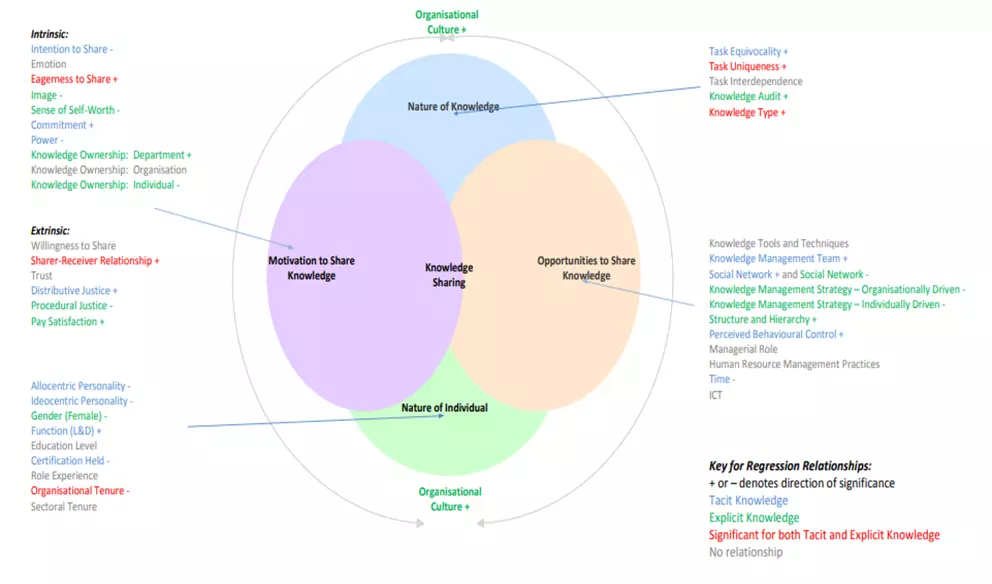Comments
- No comments found

A pragmatic locus of agency, power and influence, disposed to act and with the capacity to impact, motivate and transform!
Yes, I have long been fascinated and actively researched the role of the middle manager in organisations from SMB to Enterprise and especially the effect of continual episodic change and ‘Organisational Velocity’ on middle manager perceptions, intentions and actions. Reflecting on the rate, scope and scale of change over the last two years, the next evolution of this critical position has probably never mattered more.
In this piece, I explore the current state of play and the potential trajectory ahead drawing on original and third party research, notably from Dell Technologies who has been benchmarking change barriers and enablers across people and technology factors for many years. I posit that middle managers are not just ‘stuck in the middle’ but rather that this has rising implications across mental health, technology uptake, innovation and ultimately individual, team and organisational success. The time is now to unfreeze the middle line!
There is no relationship altered more by the pandemic than the one between employers and employees with middle managers playing a key role in embodying, enacting, and executing change.
Prof Sally Eaves, Chair of Global Cyber Trust
Over the last 2 years and in our current moment of transition we have never seen such breadth and depth of change, indeed when I spoke with Dell Perspectives at the height of the pandemic, it was a moment when half the world was living under some form of lockdown, in what may be the single most extensive and collective act ever undertaken by humanity. We have now seen an acceleration in digital transformation by some 7 years, heightened adoption and integration of emergent technologies notably AI, Cloud, 5G and IoT, and the rise of increasingly decentralised and hybrid models of working as we transition beyond.
And this all coupled with rapidly evolving consumer and employee behaviours and expectations around the criticality of trust, the personalisation of experience, awareness and protection across security, privacy and compliance, and an embedding of social impact consciousness from sustainability to inclusion – and this all impacting on employment, advocacy and purchasing preferences. This has created significant agency and leadership opportunities for individuals and organisations but also tangible pressures too, particularly navigating complexity, evolving skills requirements and the typical need to do more with less.
Organisational life has become a duality of extremes – for example, people are both working more, but also quitting positions at higher rates. Multiple surveys have found people are working longer hours when working at home than before the pandemic and also working through annual leave reserved time as well (Hays 2021). Today, the ‘Great Resignation’ has become more than a newspaper article headline or a tentative ‘intent’ to quit - it’s a reality with some 4.3 million people resigning in the US during December 2021, for context that is around 3% of the national available workforce. And it’s a similar picture in the UK, with the number of job vacancies in October through to December 2021 rising to a new record of 1,247,000 – that represents an increase of 462,000 from the pre-pandemic level set in January through to March 2020. Although more longitudinal and detailed data is needed to firmly establish which specific groups are quitting, it is clear that knowledge workers rate highly as impacted on the research available to date.
And who are the people feeling the pain the most? Middle managers. Responsible for the daily operation of businesses and ultimately shaping the environment, development and day to day experiences of employees. Even before the pandemic, some 80% of middle managers were voicing their concerns in navigating a job that is ‘increasingly difficult to manage’ (Boston Consulting Group) with Columbia University finding 18% of role holders reported depression symptoms, compared to 12% for blue-collar workers and 11% for owners/executives back in 2015.
So as to the impact today? Overworked, feeling underappreciated, close to burnout and ‘trapped’ in between; ‘picking up the slack’ yet communicating less; and experiencing a blurring of boundaries which negate work-life balance – but hesitant to seek help – these are some of the key issues emerging from my own and third party research. Toggling between supervisors above and supervisees below, the middle manager role can be complex, isolating and demanding. The average incumbent spends 42% of their time dealing with internal team conflict, works longer hours than junior staff and executives alike, and especially so within marketing, safety, business development and human resources functions (Straits Times). So while middle managers are expected to pragmatically resolve issues across the organisation, who or what is supporting them, and why does this matter so much?
Middle management is the focal point of all transformations. And at a time of unprecedented change and churn, these managers are vital to organisations – but with the ‘Great Resignation’ and the other factors described, the opposite is occurring and they are losing them! Indeed, ‘As of February X, this person does not work here anymore.’ is fast becoming a familiar auto-responder refrain. Let’s explore the implications and why it’s imperative to act.
The middle manager is critical due to the capacity to influence (Boston Consulting Group) with role holders benefiting from boundary spanning positions that can address organisational structural holes and enable vertical and horizontal relationship building, sense-making and cultural change with their substantial social capital (Eaves 2014-2021). One example of impact is the key influence of middle manager buy-in to cultivate a diverse, equitable, and inclusive work culture as identified by MIT. These are the roles that have the greatest everyday bearing on employees’ working lives yet whilst there is an heightened focus on DEI at both entry and C-suite levels, attention to middle managers is often left behind, compounded by often also being prone to under-representation on diversity of experience themselves (KPMG 2021).
These positions also afford a significant impact on explicit and implicit knowledge flow, from integrating knowledge within projects, to their influence on knowledge sharing behaviour (Ipe 2003, Eaves 2014-2021). But conversely as my original research identified, if ‘Organisational Velocity’ is high and other key influences are sub-optimal, this positive impact can revert to hiding, hoarding and disengagement protection mechanisms rather than active sharing behaviour - negating middle management knowledge sharing, and ultimately team trust and organisational innovation capacity too. This is compounded by middle managers being slower to adopt new technologies than other roles when change vectors are high – according to insights from Dell’s upcoming Breakthrough study, available from April!

©Dr. Sally Eaves - Multidimensional Model of Individual Knowledge Sharing
So how can we better support and mobilize the middle? This is something I asked Matt Baker, Senior Vice President, Corporate Strategy at Dell. And I especially resonated with his comment that middle managers need un-muddled, authentic and empathetic leaders that will ensure they feel safe and secure in their role before expecting them to execute on a digital change strategy.
“As with any problem, you need to understand it before you can propose a solution. Why is middle management frozen? Is your leadership team modelling empathetic change and communicating clear instructions? It is key to reassure managers that their roles are going to be helped by technology and not threatened by it.” Matt Baker, Senior Vice President, Corporate Strategy at Dell
And for me, the criticality is culture and education factors weighing equally to technological ones. Reflecting on the ODI Data Skills Framework this demonstrates the holistic STEAM-centric balance of skills that are imperative today. On one side of the framework, the practical skills involved with working with data are highlighted; whilst on the other it’s the strategic and critical skills needed to interpret, evaluate and deeply understand the opportunities, challenges and impact of data across business and societal outcomes – and importantly, also how to best navigate these.
This foregrounds an evolving role of the middle manager as ‘translator’ – with the pragmatic and bricoleur like capacity to balance skills from each side and communicate with language that both C-suite and new entrants can understand, and equally for decision-makers from business to IT too. It takes an underpinning foundation of STEAM skills and core competencies around literacy, with related research available here.
“Skills readiness is the move from novice to champion. And to do that, you need to undertake a data literacy audit. Look at data literacy levels across the organization but also the data confidence and skills levels – and then act on it. ” Prof. Sally Eaves, Chair of Global Cyber Trust
And I believe it takes a new and openly articulated appreciation of the middle manager role, that makes this a position to aspire to, not to avoid. This involves a new holistic approach to talent engagement, bringing together flexible working, active management listening and support to prioritise development and instil a culture of camaraderie and belonging, with accessibility to the tools, skills and technologies (including in non-tech facing middle management roles) that both drives growth and also makes work more meaningful, satisfying, creative and ultimately productive too. That’s shared value!
The antithesis between the demands placed upon the middle manager and the benefits gained and moreover, expected from this level has been overlooked for too long. There is clear capacity for the middle line to progress from being informed change intermediaries to informing agents of change when the appropriate contextual situation and support is in place: a combination of technology, culture and education. The time is now to afford middle managers the right tools, from technology to skills investment, ‘to do the right thing and not freeze them out’ (Hughes in Bloomberg 2021). With this support and indeed a ‘re-valuing’ of this critical role, I believe we can begin to change the narrative and move beyond a Great Resignation to a new era that embraces levelling-up and shifting expectations especially around purpose, and fosters a new renaissance – I call this the ‘Great Aspiration’.
Eaves S, “Middle Management Knowledge by Possession and Position: A Panoptic Examination of Individual Knowledge Sharing Influences” The Electronic Journal of Knowledge Management Volume 12 Issue 1 (pp67-82) available online at www.ejkm.com
Eaves, Sally. "Mixed Methods in Knowledge Management and Organisational Research." Encyclopedia of Information Science and Technology, Third Edition, edited by Mehdi Khosrow-Pour, D.B.A., IGI Global, pp. 623-632. https://doi.org/10.4018/978-1-4666-5888-2.ch059
Dr. Sally Eaves is a highly experienced Chief Technology Officer, Professor in Advanced Technologies and a Global Strategic Advisor on Digital Transformation specialising in the application of emergent technologies, notably AI, FinTech, Blockchain & 5G disciplines, for business transformation and social impact at scale. An international Keynote Speaker and Author, Sally was an inaugural recipient of the Frontier Technology and Social Impact award, presented at the United Nations in 2018 and has been described as the ‘torchbearer for ethical tech’ founding Aspirational Futures to enhance inclusion, diversity and belonging in the technology space and beyond.
Leave your comments
Post comment as a guest